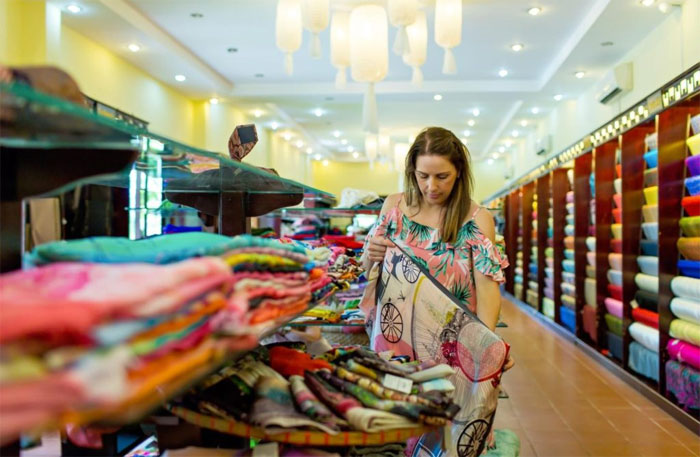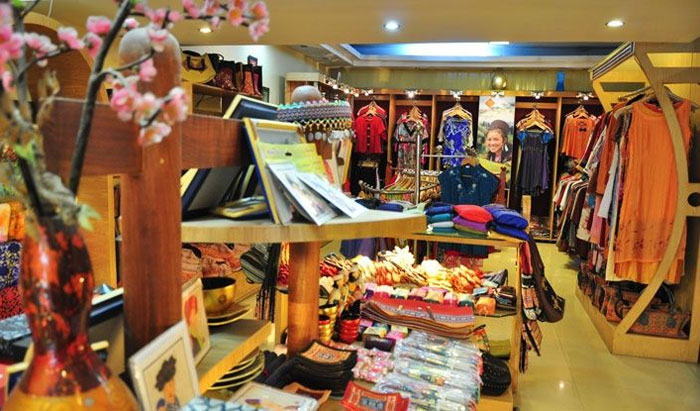There is even art about how to bargain in Vietnam that appeals to foreign visitors who first do shopping in the attractive country. As long as you know the art, it becomes quite easy and enjoyable to get good deals as well as the memorable bargaining experiences in Vietnam. Read on to know top 7 golden tips and you will soon become a professional “bargainer.”
#1: Research the average prices before you bargain in Vietnam
Before the bargaining adventure, it’s necessary to come prepared with basic knowledge about the average prices of several items in the country. For instance, a T-shirt in the flea market is just around USD5 – USD10. Also, a pair of sneakers in the street market cannot be more expensive than USD50; the price must be lower. Provided that you’re shopping in a night market with many booths, the smart idea is to visit some booths to check the prices before you bargain and make a deal. This brings the exhilarating experiences in which you shop like the locals do. Know that some Vietnamese women even stop at five cloth booths before they finally buy a dress.
#2: Watch the merchant’s attitude
As the foreigners, you might surprise the local merchants that you can bargain. They might be much surprised with the wide eyes and open mouth. But quickly, they will regain the normal status and answer to your suggested rates. At this time, watch their reactions. If they laugh and say OK immediately, then understand that you make a bad bargain; the real prices are much lower. And if the sellers say No instantly and don’t have an intention to keep you at their shops, then believe that your suggested prices are unacceptable to them. Another case is that the sellers might let you go a few steps and then call you back, then remain firmly with your bargained rates and confident attitude; as long as they agree with your intended prices, you’ll buy. So, the golden key here is to watch and act during bargain shopping Vietnam.
#3: Be the moderate shoppers
Though you like the objects very much, try to keep the moderate feeling to achieve the moderate prices. While you’re watching the merchants’ attitude, they are watching yours, too. Therefore, restrict your liking for the items so that you can get a good bargain. If the sellers realize that you have a special and strong liking for the products, they will overprice it, and bargaining loses the effect. The successful shoppers should stay calm, check out some different items, and tell the prices they want in a clear way. This does NOT mean that you pretend to underestimate the items in order to give the low prices because this brings the negative results: the dealers might get angry, do not want to sell anymore, and you cannot possess the things that seem to be made only for you. Hence, the key is to be the moderate, happy, and patient customer who can make a good impression on the vendors and get the “destined” products. This results in the happy bargaining in Vietnam.
#4: Be the first customer
According to the Vietnamese belief, the first customer is very important and might decide the sales of the whole day. If you first buy in a quick and favorable way, then the shop will have a day to “sell like the hot cake”, and vice versa. In that sense, some local vendors offer the special prices only to the first customers. This means you have to catch the right moment when the shop is just open to make the deals. However, they can use “this technique” to trick you to buy at their wanted prices. Also, this way covers some risks because the first clients must buy the things that they pick up; otherwise, the seller will scowl.
#5: Stay confident when you tell the prices
There is an intangible worry that many inexperienced shoppers are afraid of being insulted or even beaten by the merchants when they tell the bargained prices. Also, some experienced sellers know this, and they might frighten the faint-hearted buyers by scowling or grimacing. Nonetheless, do you remember the golden rule “Customer is king”? You have the rights to buy and not to buy. Therefore, remain firmly with your expected prices and let the vendors know, whether or not they are happy with the numbers. In return, they have the rights to sell and not to sell; none forces them to sell at the non-profit charges.
#6: Improve your shopping knowledge
Can you distinguish the authentic items from the fake ones? There are several ways to notice, and it’s vital to equip yourself with this knowledge before you buy a pair of sneakers or something else valuable. The super-fake, fake 1, and fake products are plenty in the markets which require everybody to be the knowledgeable shoppers who know clearly the quality level of what they buy, who don’t buy the fake things at the prices for the genuine ones, and who can overcome most of the fraudulent traps.
#7: Let the sellers know that “other places offer the better prices”
Though this is the first shop that you visit, it’s effective to just tell the merchant that “you have been in the other stores, and they offer the better prices.” The common result is that the seller might lower the price a bit and understand that you’ve done the research, and it is not easy to trick you. Then, bargaining will become easier, and you’re likely to reach the desired charges. There are some sellers who sell at the fixed prices and will not reduce it regardless of what you say. In this case, if you really like the item and want it yours, then just pay and believe that the price is reasonable.
So, can you bargain in Vietnam? These golden tips of bargaining promise to bring the greatest deals ever! Apply tip by tip, and as time passes, no merchants can trick you who know the art to make a deal.
People read also:
 Vietnam Travel Guide Backpacking and Individual Travel Blog
Vietnam Travel Guide Backpacking and Individual Travel Blog








